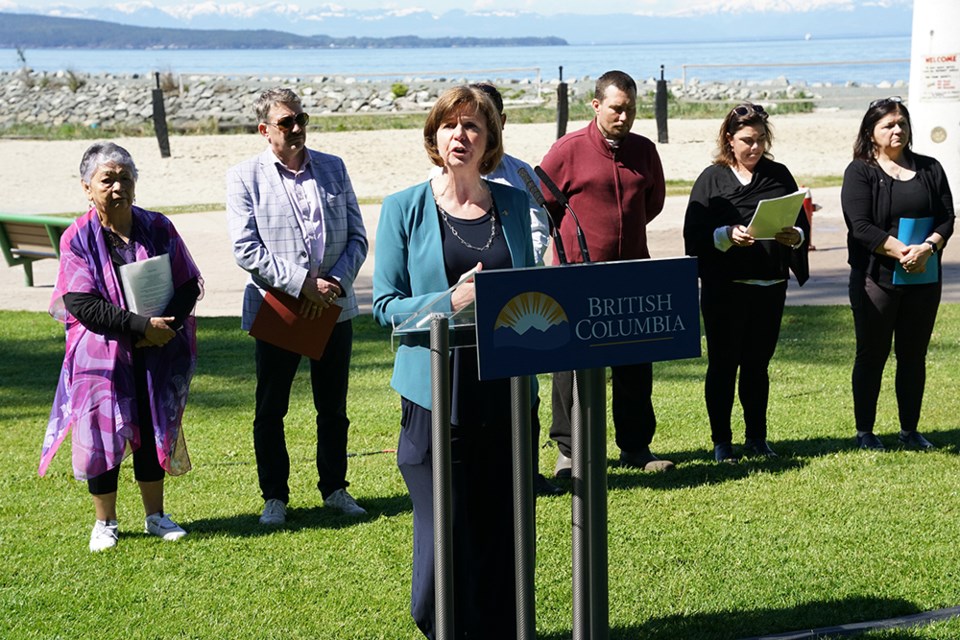People in the qathet region with complex mental health and substance-use challenges who are at risk of experiencing homelessness will soon benefit from 20 new complex-care housing spaces.
“Although everybody in BC deserves a home, a dignified and respectful place to live, people who have suffered mental illness and substance use challenges have historically been left behind,” said minister of mental health and addictions Sheila Malcolmson at an official announcement at Willingdon Beach on May 20. “Their complex and unmet needs have often led to cycles of evictions, homelessness, emergency rooms, and sometimes, jail. Complex-care housing is a ground-breaking approach for people with overlapping mental-health and substance-use challenges, and traumatic and acquired brain injury.
“This new system of care connects people to the service they need right in their homes, and they have a commitment not to evict them. These new complex-care housing spaces will provide supports for people right in their homes to help break the cycle of homelessness and foster stability. Four transitional spaces will also be created that people can access during periods of acute need.”
According to a media release from the ministry, the spaces will be located in one or more central sites and delivered in partnership with Tla’amin Nation, Lift Community Services and Vancouver Coastal Health. Malcolmson said locations will be identified for the 20 spaces her ministry is funding.
In addition to the new spaces, the region will also get four stabilization or respite spaces that will offer enhanced, short-term support to people in the community, including from Tla’amin. These sites will be ready in late 2022.
“Mental-health and substance-use issues are challenges that affect us all, directly and indirectly,” said Tla’amin health director Marlane Christensen. “Providing stability and complex-care housing services to those most in need serves the individual, their family and the entire community. We need to walk this road together."
Variety of supports
The spaces will offer a variety of supports, depending on individual need, for example: medication-assisted treatment; overdose-prevention services; psychiatry services; primary-care services; family and peer supports; skills training and counselling; cooking and meal support; and for Indigenous residents, ceremonial supports and connection to elders.
“Today, our provincial and community partners make good on commitments to provide more support, resources and hope to our most vulnerable community members,” said Stuart Clark, executive director, Lift Community Services. “This partnership is another example of our community coming together to address the needs of its citizens, and the government of BC continuing to listen and respond to the needs of communities. We are honoured to be a partner on this project, and we are excited to get to work.”
Miranda Compton, executive director for substance use and priority populations with Vancouver Coastal Health said: “We’re pleased to be working with our community partners to provide this innovative model of care for those with complex mental-health and substance-use challenges. Complex-care housing offers high levels of health and social supports that will strengthen the care we provide to our clients. This initiative is a wonderful opportunity to collaborate with our First Nation partners and work together to provide enhanced, holistic support for community members.”
According to Nicholas Simons, MLA for Powell River-Sunshine Coast, in the past, those who experienced complex mental-health and substance-use challenges were neglected and left behind.
“Our government is changing that with complex-care housing,” said Simons. “These new spaces will serve the most vulnerable members of our community and provide those with complex mental-health and substance-use challenges the services and supports they need.”
According to a provincial media release, the complex-care program will provide an enhanced level of integrated health and social supports that serve people where they live. Complex-care housing is voluntary and integrated within the health-care system with direct connections to treatment and specialized care that could include support from nurses, peers, social workers and other health professionals.
“On behalf of city council and our residents, I want to sincerely thank the Government of BC for providing the funding to establish complex-care services in our community,” said Powell River mayor Dave Formosa. “This next level of care will enhance supports for people struggling with mental-health and substance-use issues. The city looks forward to working with these partners to make this new service a reality.”


